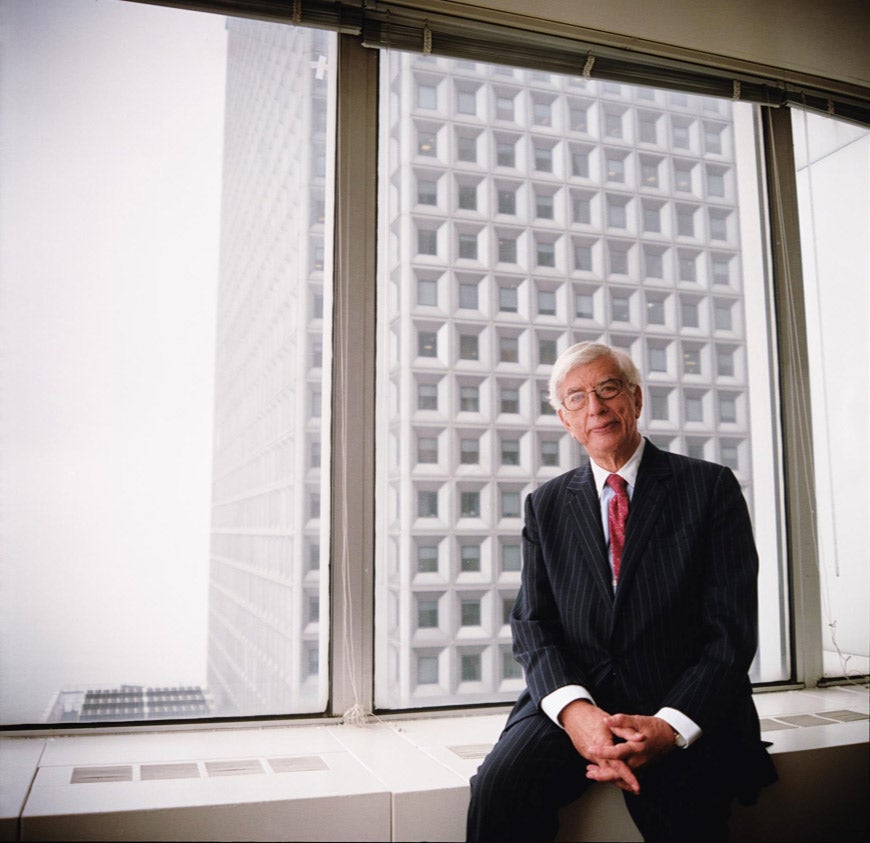On Intellectual Boot Camp and Supreme Gossip
M. Bernard Aidinoff ’53 is senior counsel at Sullivan & Cromwell in New York City, where he has practiced for nearly 50 years. A recent recipient of the Distinguished Service Award of the ABA’s section of taxation, Aidinoff served as chairman of his 50th reunion gift committee and is a member of the HLS Visiting Committee.
You’re from the Class of 1953, the first Harvard Law School class to include women. What was that like from your perspective?
Well, many of us had come from coed colleges and universities, and quite frankly, we thought it was weird that Harvard Law School did not have women prior to our class. The general attitude was, “It’s about time.” But there was little recognition by the men in our class of the significance of the change and its importance to the newly admitted women and to women in general.
After graduating, you clerked for Judge Learned Hand LL.B. 1896, a real legend. What was that like?
It was a great year. Hand was in his eighties and had senior status; he did not carry a full caseload. The result was I had a lot of one-on-one time with the judge. On Tuesday mornings, we would discuss the Supreme Court decisions that had been handed down on Monday. He would always want to know what I thought, and we would argue the merits of the cases as well as the reasoning and quality of the opinions. Hand drafted his own opinions and the memoranda to the other judges. His clerks could make comments, disagree with him and on occasion convince him to make changes. His law clerks did not do first drafts.
Hand was a wonderful gossip, and he spoke frankly about each of the justices. We also frequently rode the subway home together in the evening.
Was there a particularly memorable moment?
The whole experience was memorable. I was very lucky!
You’ve spent nearly 50 years in practice. When you look back, what was the most valuable part of your HLS training?
First year, to me, was one of the most marvelous experiences I ever had. The type of training, the rigor, the method of argument–it was really intellectual boot camp. I loved nearly all of the first-year classes, and I had some amazing professors (Fuller, Kaplan and Seavey). They were truly masters of the Socratic method. We had one or two teachers who weren’t quite as good, but we forget about them.
What has been your main area of practice?
Tax, particularly corporate and international tax. But I still don’t know how to fill out a return.
Do you think of law practice today as a profession or an industry?
I haven’t heard it put quite that way, but there is no question that the private practice of law, particularly big-firm law, is a business. At the same time, there is constant awareness that professional standards must be maintained. So the question is: How do you retain the independence of being a true professional? How do you retain collegiality, the camaraderie, the sense of purpose that you are doing something more than just making money?
As a supporter of the law school, you’re familiar with the current campaign and the Strategic Plan. Is there a part of the planning that really resonates with you?
The expansion of the faculty is important. Harvard’s got the toughest standards for its faculty, and we all want that to continue. But you have to prepare years in advance for great professors not living forever. We need more courses in more areas, and in order to do that, we need a larger number of faculty members who have the capacity and drive to be great scholars and great teachers. This also means that you have to take risks in recruiting younger faculty members.
